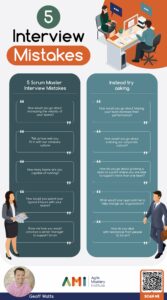Scrum Master Interview Questions - The Do's and Dont's
Posted By - Geoff Watts

The Agile Interview Questions Series:
Interviewing for a Scrum Master can be challenging. It’s a job that is difficult to tie down and know what to talk about in order to get a feel for both their fit for the team and your organisation. I’m going to share the top 5 mistakes companies make when interviewing for a Scrum Master and what the ideal questions for a scrum master interview are.
A Scrum Master shouldn’t fit your company culture
A common question is asking how well the candidate aligns with the company values. On one hand it’s a good thing for candidates understanding the culture they are going to be part of and there will be less tension if there is greater alignment.
The problem is, if you look at the typical company values, it’s rare that anyone will actually disagree with any of them. Who would disagree with things like Diversity, Teamwork, Celebrating Success, Innovation, Passion, Integrity, Respect and Customer Focus?
Also you actually WANT the candidate to shake things up a little. A Scrum Master isn’t someone you should be hiring to keep things the same. Great Scrum Masters will have one eye on the team they are working with
Instead ask “How might our corporate values undermine what we are trying to achieve?” Or “How would you go about evolving our corporate culture?”

A Scrum Master isn’t responsible for increasing the velocity of the team
Scrum Masters aren’t responsible for delivery but rather they are responsible for ensuring those that are responsible for delivery are able to execute their tasks.
The more the organisation looks to the Scrum Master as responsible for delivery, the less the team will look to step up into self-management. When the Scrum Master is responsible for delivery, they are less likely to be open with things like estimates, progress and reflection because they will feel like they are being managed.
Setting a Scrum Master up as the person responsible for increasing the velocity of the team will certainly lead to games being played between the team and the Scrum Master – the one person you would want the team to be open and honest with.
Instead ask “How would you go about helping your team increase their performance?”

A Scrum Master shouldn’t “run” multiple teams (at least to begin with)
First of all, Scrum Masters don’t ‘run’ teams. They provide a form of leadership, sure, but a Scrum team is intended to be self-managing so looking for a Scrum Master to run a team is missing the point.
But when you get past that, asking them to lead multiple teams to begin with is setting all of those teams up for mediocrity at best. Spreading a Scrum Master too thin, across multiple teams, means the difficult parts of team growth are avoided or neglected. Instead, all the Scrum Master is able to do is tackle the mechanical, ceremonial aspects of the Scrum framework.
Instead ask “How do you go about growing a team to a point where you are able to support more than one team?”

A Scrum Master shouldn’t just focus at the team level
Interviewers often focus on the team level responsibilities of the Scrum Master and don’t realise or forget (or possibly avoid) their change agent accountabilities. Hiring someone who can work well with a team and create an environment where that team can survive in the organisational culture is nowhere near as important as finding someone who can instigate (tactful) disruption at the organisational level.
Creating an environment that actively supports Scrum teams is a game-changer as those teams can thrive and the benefits of self-managing teams are multiple times greater than teams that are well facilitated by a good Scrum Master
Ask instead “What would your approach be to help change our organisation?”

A Scrum Master doesn’t convince people to do Scrum
Even “Mentalists” like Derren Brown cannot make people do something they don’t want to do. I can’t convince people to do anything, yet I can be persuasive and I can create the conditions for people to consider alternative perspectives and feel safe to adopt a different stance or try something new. Scrum Masters may be enthusiastic about the benefits of an agile approach but they aren’t evangelical people looking to convert people to their way of thinking.
Ask instead “How do you deal with resistance from people to Scrum?” or “How do you help people open their mind to alternative points of view?” or “When would Scrum not be appropriate?” – see this post on 3 Things to know about when Scrum is appropriate

A Scrum Master is not just the Team Secretary
A common misconception is that the Scrum Master should be the one taking care of administrative tasks for the team, such as scheduling meetings, taking minutes, buying the doughnuts or managing the task board. This is a mistake that can lead to a Scrum Master being perceived as a glorified secretary rather than a valuable facilitator and coach. In reality, the Scrum Master’s role is to help the team become self-sufficient, empowering team members to take responsibility for their work and take ownership of their processes.
Instead of asking, “How do you manage the team’s calendar and task board?”, ask, “How do you empower your team to take ownership of their work and processes?” or “What strategies do you use to enable your team to become self-organizing?”
By shifting the focus from administrative tasks to promoting autonomy and self-management, you’ll ensure that the Scrum Master you hire will be a catalyst for growth and improvement rather than just an organizer.
My favourite question for a scrum master interview?
One of my favourite questions to ask a Scrum Master is
“Can you tell me about something you have read recently that you found interesting?”.
Then you hire them…
After you have found the right person, what should you watch out for and help your new hires avoid? Here’s an interesting article “You’ve Landed Your Next Scrum Master Job. Now What?”








